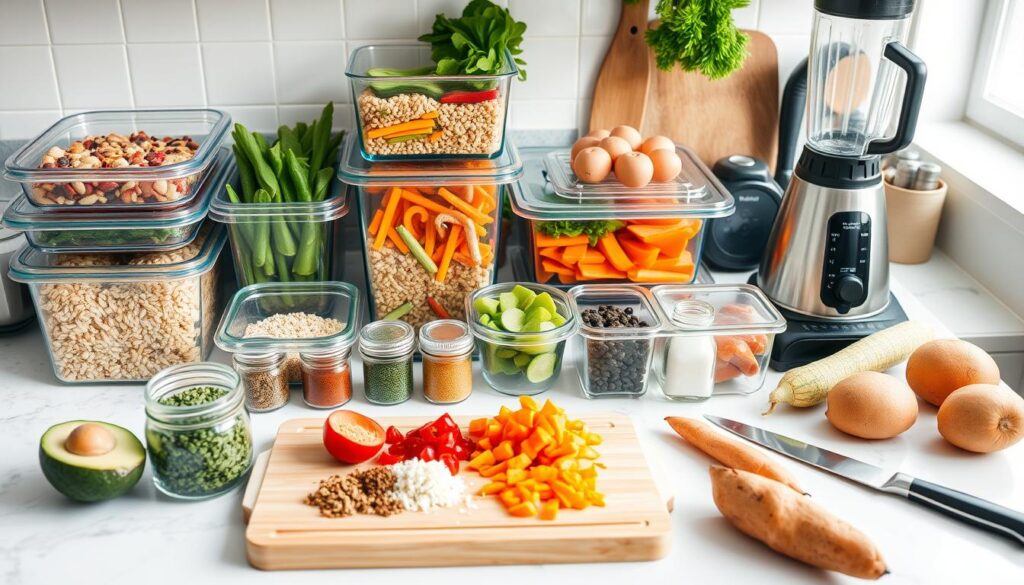Do you find it hard to eat healthy with a busy schedule? Meal planning might seem daunting, but lazy cooking offers a simple solution. This guide shows how easy it is to make healthy meals for the week without spending hours cooking.
Healthy eating doesn’t need to be complicated. With the right meal planning, you can make tasty, nutritious meals even when you’re busy. Lazy meal prep is all about being efficient, not exhausting.
Imagine coming home to a delicious meal after a long day. No more stressful cooking or unhealthy takeout. Our lazy cooking tips will change how you view meal prep.
Key Takeaways
- Simplify your weekly nutrition with minimal effort
- Save time and reduce daily cooking stress
- Create nutritious meals without complex techniques
- Minimize food waste through strategic planning
- Enjoy delicious, home-cooked meals with less work
Understanding the Benefits of Smart Meal Preparation
Meal prep is more than a kitchen trend. It’s a way to cook efficiently and eat healthily. Spending a few hours each week on meal planning and prep can change how you see food and your daily life.
Smart meal prep brings many benefits beyond just having food ready. Let’s look at the main advantages for busy people.
Time-Saving Advantages
Meal prep saves a lot of time and reduces stress. Imagine having a healthy meal ready in minutes, not hours every day.
- Reduce daily cooking time by up to 70%
- Eliminate last-minute meal decision stress
- Create more personal time for work, family, and hobbies
Cost-Effective Benefits
Meal prep also saves money. It helps you avoid food waste, cut down on impulse buys, and shop smarter.
“Meal prep is like a financial diet for your kitchen—it helps you save money while eating better.” – Nutrition Expert
Health and Nutrition Improvements
Prepping meals in advance makes healthy eating easier. You can control portions, balance nutrients, and avoid fast food.
- Control calorie intake more effectively
- Ensure balanced, nutrient-rich meals
- Reduce reliance on processed foods
By embracing meal preparation, you’re not just cooking—you’re investing in a healthier, more efficient lifestyle.
Essential Tools and Equipment for Effortless Meal Prep
Having the right kitchen gadgets and food storage solutions is key to successful meal prep. Quality cooking tools can make meal prep efficient and less tedious.
Let’s look at the must-have meal prep containers and kitchen tools for a better food preparation strategy:
- Glass storage containers with secure locking lids
- Meal prep containers with compartments
- High-quality chef’s knife
- Digital food scale
- Instant-read thermometer
- Large cutting boards
Choosing the right food storage containers is vital for keeping meals fresh and organized. Look for containers that are microwave-safe, dishwasher-friendly, and leak-proof.
“The right tools make meal prep not just easier, but enjoyable.” – Professional Chef
| Kitchen Tool | Purpose | Price Range |
|---|---|---|
| Glass Meal Prep Containers | Long-term food storage | $20-$50 |
| Digital Food Scale | Portion control | $15-$30 |
| Multi-Compartment Containers | Separate meal components | $25-$60 |
Smart kitchen gadgets can greatly cut down meal prep time. They help keep your meals nutritious and varied throughout the week.
The Lazy Way to Prep Healthy Meals for the Week
Turning meal prep into a breeze doesn’t need superhuman skills. With smart tips and quick recipes, anyone can cook healthy meals easily. This way, you can enjoy tasty, nutritious food all week long.
Starting with meal prep is about being efficient and saving kitchen time. It’s about finding a method that fits your life and schedule.
Minimal Effort Strategies
Make your meal prep easy with these smart tips:
- Choose recipes with overlapping ingredients
- Invest in quality storage containers
- Prep ingredients in bulk on less busy days
- Utilize one-pan or sheet pan cooking methods
Time-Efficient Methods
Quick recipes are about smart work, not just speed. Try these time-saving tips:
- Use a slow cooker or instant pot for hands-off cooking
- Roast multiple protein sources simultaneously
- Chop vegetables in advance
- Prepare versatile base ingredients like grains and proteins
Energy-Saving Techniques
| Technique | Time Saved | Effort Level |
|---|---|---|
| Batch cooking | 3-4 hours per week | Low |
| Freezer meal prep | 2-3 hours per week | Medium |
| Ingredient prepping | 1-2 hours per week | Low |
Using these easy cooking tips, you can set up efficient meal prep systems. They save time, reduce stress, and keep you healthy all week.
“Meal prep is not about perfection, but about making healthy eating more accessible and manageable.”
Smart Shopping: Creating Your Weekly Grocery List
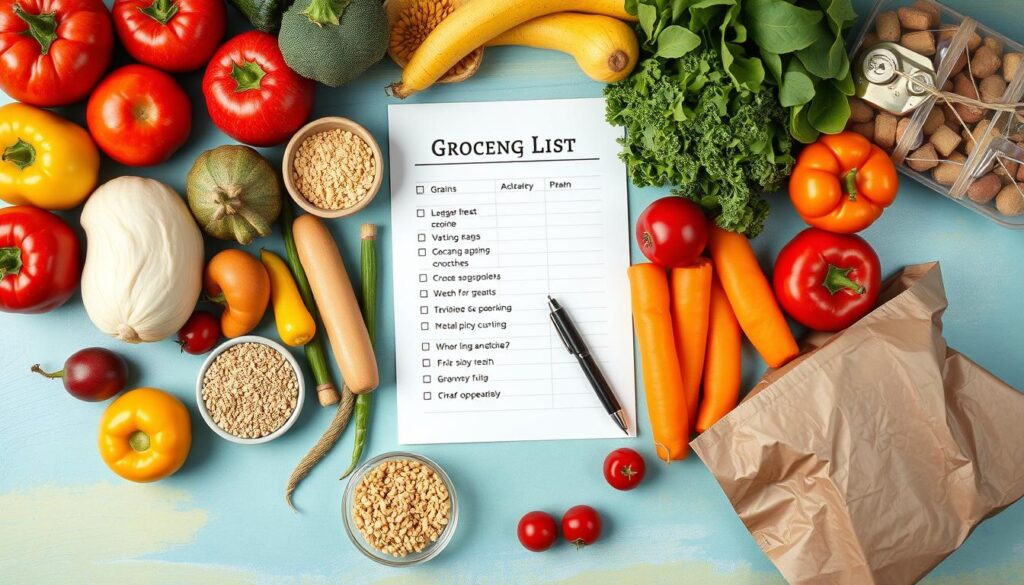
Learning how to shop for groceries can make meal planning easier. A good grocery list helps you save money and shop more efficiently.
“A well-planned grocery list saves time, money, and reduces food waste.” – Nutrition Experts
To make a smart grocery list, start by planning your meals. Then, check what you already have at home. This helps you avoid buying things you don’t need.
- Prioritize versatile ingredients that work across multiple recipes
- Purchase seasonal produce for maximum freshness
- Compare prices and look for weekly sales
- Consider bulk purchasing for non-perishable items
Smart shoppers know how to shop well. They keep track of their spending and find ways to save money without sacrificing nutrition.
| Ingredient Category | Budget-Friendly Options | Cost Savings |
|---|---|---|
| Proteins | Chicken, eggs, beans | $10-15/week |
| Grains | Rice, oats, pasta | $5-8/week |
| Vegetables | Frozen, seasonal produce | $8-12/week |
By following these tips, you can make your meal planning more efficient and cost-effective. It will save you time and money.
Time-Saving Kitchen Shortcuts and Hacks
Turning meal prep into a breeze doesn’t need magic—it just needs smart tricks. The right methods can cut down your kitchen time. They keep your food tasty and healthy.
Chefs and home cooks use smart strategies to speed up food prep. These tips save time and lower stress while cooking.
Quick Cutting Techniques
- Use a sharp chef’s knife for faster, more precise vegetable chopping
- Invest in a mandoline slicer for uniform cuts in seconds
- Pre-wash and pre-chop vegetables during weekend meal prep
Batch Cooking Tips
Batch cooking is a lifesaver for those with busy lives. It lets you make many meals with little extra work.
- Cook grains and proteins in bulk
- Use slow cookers or instant pots for hands-off cooking
- Portion and freeze meals for quick future reheating
“Work smarter, not harder in the kitchen. Your future self will thank you.” – Culinary Pro
Storage Solutions
Storing food right is key to keeping it fresh and safe. Get good, leak-proof containers for fridge to microwave use.
With these kitchen hacks, you’ll change your meal prep game. You’ll save time, stress less, and enjoy great meals all week.
Simple Breakfast Prep Ideas for Busy Mornings
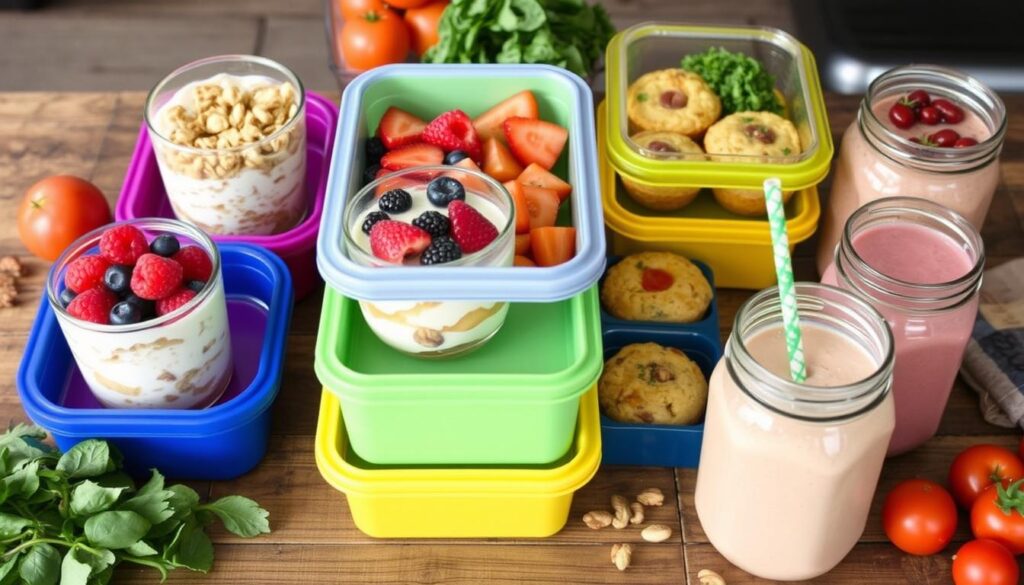
Mornings can be chaotic, but make-ahead breakfasts are the ultimate solution for busy individuals. They offer quick morning meals. Developing a strategic approach to breakfast preparation can transform your entire day.
It provides healthy breakfast ideas that save time and energy.
“Breakfast is the most important meal of the day – make it count without spending hours in the kitchen!”
Create grab-and-go options that are both nutritious and delicious. Here are some simple meal prep strategies:
- Overnight Oats: Prepare multiple jars with rolled oats, milk, chia seeds, and your favorite fruits
- Breakfast Burritos: Batch cook and freeze protein-packed wraps
- Smoothie Packs: Pre-portion ingredients in freezer bags for instant blending
- Egg Muffins: Bake individual portions with vegetables and proteins
The key to successful make-ahead breakfasts is versatility and planning. Spend 1-2 hours on the weekend to prepare multiple meals. These can be quickly reheated or assembled in minutes during busy weekday mornings.
These quick morning meals not only save time but ensure you start your day with balanced nutrition. By prepping in advance, you’ll eliminate morning stress. You’ll also maintain a consistent, healthy eating routine.
No-Cook Lunch Options for the Week
Busy professionals and students are always looking for easy lunches. No-cook meals are perfect for those who don’t want to spend hours cooking. They offer nutritious, portable options.
Making tasty cold lunches is easy with a little planning. You can create meals that keep you going all day with just a few ingredients.
Mason Jar Salads: A Portable Lunch Revolution
Mason jar salads are a great no-cook meal choice. They keep your food fresh and make preparing meals simple.
- Start with dressing at the bottom
- Add hearty vegetables next
- Layer proteins and grains
- Top with delicate greens
Protein-Packed Alternatives
Looking for filling no-cook meals? Choose protein-rich options for energy without cooking.
| Protein Source | Preparation Time | Nutritional Value |
|---|---|---|
| Canned tuna | 2 minutes | High protein, omega-3 |
| Rotisserie chicken | 5 minutes | Lean protein, versatile |
| Premade hummus | 0 minutes | Plant-based protein |
Quick Assembly Ideas
Speed meets nutrition with these easy lunch ideas that need no cooking:
- Turkey roll-ups with cheese and spinach
- Greek yogurt parfaits with granola
- Chickpea and vegetable wraps
“Meal prep doesn’t have to be complicated. Sometimes, the simplest solutions are the most delicious.” – Nutrition Expert
Adopting these no-cook lunch strategies saves time and reduces stress. You’ll enjoy tasty meals all week.
Easy Dinner Solutions That Last Multiple Days
Learning to make-ahead dinners can change how you plan meals for the week. Batch cooking is a clever way to make versatile recipes. It saves time and cuts down on daily cooking stress.
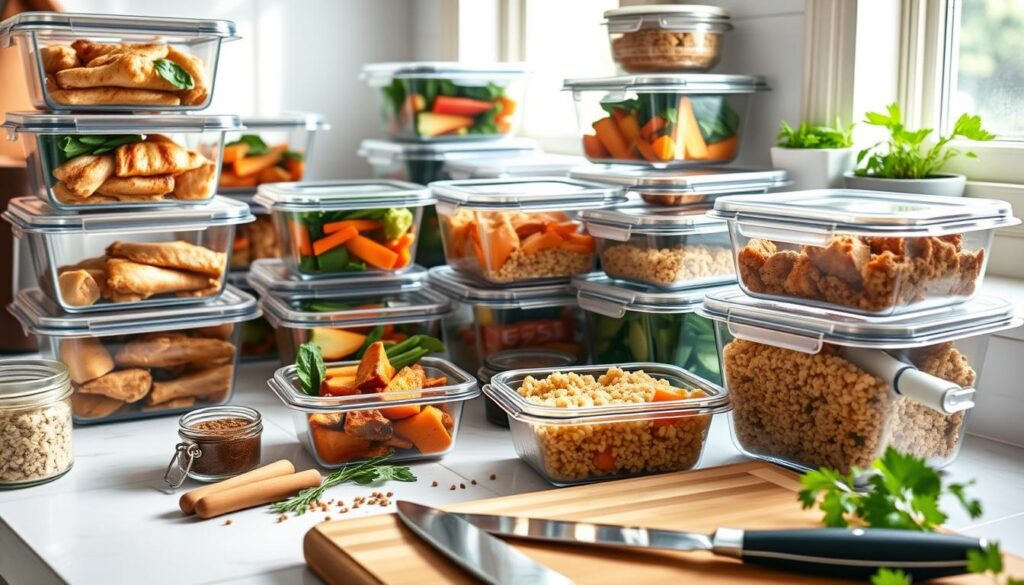
Smart cooks know the value of turning leftovers into new meals. A single protein or base can turn into many tasty dishes throughout the week. This is thanks to creative ways to transform ingredients.
- Roast a large chicken for multiple meal variations
- Prepare protein-rich base recipes that adapt easily
- Develop cooking strategies that maximize ingredient potential
“Efficient meal preparation isn’t about cooking more – it’s about cooking smarter.” – Professional Chef Recommendation
Here are some smart ways to tackle dinner:
- Protein Flexibility: Grilled chicken can become tacos, salads, and sandwiches
- Grain Base Transformations: Quinoa serves as a versatile foundation for multiple dishes
- Sauce and Seasoning Variations: Change flavor profiles without starting from scratch
Batch cooking lets you make meals like restaurants at home, but with less time spent cooking. The trick is to have a collection of recipes that are flexible and fun. They make cooking easier and more exciting.
Storage Guidelines for Maximum Freshness
Keeping your meal prep fresh and safe is key to enjoying healthy food all week. The right storage methods can make your meals last longer and taste better. This helps keep your food nutritious and delicious.
Knowing how to store your meals right can change your prep game. Let’s dive into some top tips for keeping your food fresh and tasty.
Choosing the Right Meal Prep Containers
Finding the right containers is the first step in storing food well. Look for these important features:
- Airtight seals to keep out moisture and air
- BPA-free materials for your health
- Options that are safe for microwaves and dishwashers
- Stackable designs to save fridge space
Refrigeration Guidelines for Optimal Freshness
Keeping your food at the right temperature is key to quality and safety. Follow these tips for the fridge:
- Put cooked meals in the fridge within two hours
- Keep the fridge at 40°F (4°C) or below
- Use clear containers to track meal dates
- Eat fridge meals within 3-5 days
Smart Freezer Meal Tips
Freezing is a great way to keep your meals fresh longer. Here are some freezer tips:
- Choose containers safe for the freezer with tight lids
- Label containers with what’s inside and when
- Leave space for liquids to expand when freezing
- Frozen meals usually stay good for 2-3 months
“The key to successful meal prep is not just in the cooking, but in the smart storage.” – Meal Prep Experts
Pro tip: Invest in quality food storage containers and develop a consistent labeling system to maximize the effectiveness of your meal preparation routine.
Avoiding Common Meal Prep Mistakes
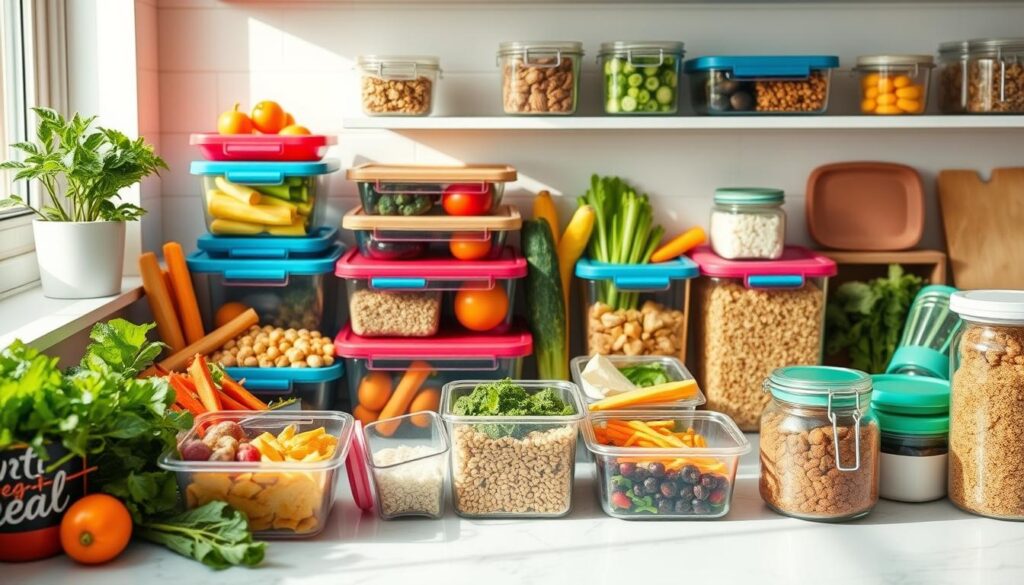
Meal prepping can change your life if you avoid common mistakes. Knowing these errors helps you make better meal plans. This way, you can enjoy your meals more.
Keeping food safe is key to good meal prep. Bad handling and storage can harm your health. This can ruin all your meal prep efforts.
- Neglecting portion control often results in overproduction or insufficient meals
- Failing to diversify meal options can cause dietary boredom
- Overlooking proper food storage techniques compromises meal quality
Adding variety to your meals keeps things interesting. Repetitive meals can quickly become uninspiring, leading to potential diet derailment.
“Successful meal prep is about smart planning, not just cooking in bulk.” – Nutrition Expert
Here are some tips to avoid mistakes:
- Invest in quality storage containers
- Plan meals that can be easily modified
- Practice proper food safety techniques
- Use portion control tools and measurements
By following these tips, meal prep can become a stress-free, enjoyable part of your week. It will help you stay healthy and reach your wellness goals.
Making Your Meal Prep Routine Sustainable
Creating a sustainable meal prep strategy is key for long-term healthy eating. It turns a tough task into a fun lifestyle habit. This habit supports your nutrition and wellness goals.
Building Lasting Habits
Building reliable meal prep habits takes planning and patience. Start with small, easy changes that become natural over time. Here are some tips:
- Begin with 2-3 meal preps per week
- Choose recipes you genuinely enjoy
- Set realistic expectations for yourself
- Track your progress and celebrate small wins
Adapting to Different Schedules
Flexible meal planning is key to staying consistent. Your meal prep strategy should fit your work, family, and personal life.
| Schedule Type | Meal Prep Strategy |
|---|---|
| Busy Professional | Weekend batch cooking |
| Student | Midweek quick prep sessions |
| Parent | Family-inclusive meal preparation |
Maintaining Motivation
“Success is the sum of small efforts, repeated day in and day out.” – Robert Collier
Staying motivated means understanding your wellness journey. See meal prep as an investment in your health. Create a supportive environment that backs your meal prep habits. Celebrate your nutrition commitment.
Conclusion
Lazy meal prep is more than just cooking—it’s a way to change your eating habits. It lets you save time in the kitchen while still eating well. We’ve shown you how to plan meals efficiently, making cooking easier.
This approach does more than save time. It helps you make better food choices and reduces stress. You’ll enjoy healthy meals without spending hours cooking.
Start your easy meal prep journey today. Try out these tips and remember, it’s about progress, not perfection. These methods work for anyone, whether you’re busy or just want to cook less.
Adopting these lazy meal prep ideas is good for your health and saves you time. Start with small steps and stick to it. Soon, you’ll see how these simple changes improve your life and cooking.
FAQ
How long can I store meal-prepped food in the refrigerator?
You can store most meal-prepped foods in the fridge for 3-5 days. Seafood and cooked meat usually last 3-4 days. Veggie dishes can last up to 5 days. Always use airtight containers and check for spoilage before eating.
Can I freeze my meal-prepped dishes?
Yes, you can! Many meal prep dishes freeze well. Soups, casseroles, and grain dishes freeze for 2-3 months. Freezing in individual portions makes reheating easier.
What are the best containers for meal prepping?
Choose BPA-free, microwave-safe containers with tight lids. Glass containers with compartments are great for keeping ingredients separate. Brands like Pyrex and OXO are good choices.
How can I prevent my meal-prepped food from getting soggy?
Keep wet and dry ingredients separate until eating. Use mason jars for salads, with dressing at the bottom. Pack sauces separately for sandwiches and wraps.
Is meal prepping more expensive than regular cooking?
Meal prepping can actually save money. It reduces waste, cuts down on takeout, and lets you buy in bulk. Planning meals helps you make smart grocery choices.
How do I keep my meal-prepped food tasting fresh?
Add flavor with herbs, spices, and marinades. Avoid overcooking veggies. Add fresh herbs or a squeeze of lemon just before eating to refresh the meal.
Can I meal prep if I have dietary restrictions?
Yes! Meal prepping is very flexible. It can fit various diets like vegetarian, vegan, gluten-free, or keto. Just find recipes that meet your dietary needs.
How much time does meal prepping actually save?
Meal prepping saves 3-5 hours a week. Spend 2-3 hours on a weekend or less busy day. This saves time on daily cooking and cleanup.
What are the best foods for beginners to meal prep?
Start with easy foods like chicken breasts, roasted veggies, quinoa, and hard-boiled eggs. These can be mixed to make different meals.
How can I keep my meal-prepped food safe to eat?
Cool foods quickly and store them at the right temperature. Use clean containers and eat within the recommended time. Reheat foods to 165°F to kill bacteria.

